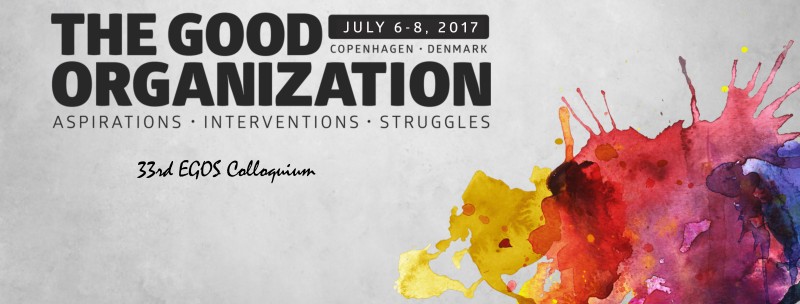PDW 04: Experimental Research in Organization Studies
Call for Applications
Presenters & Facilitators:
Jana Gallus, UCLA Anderson, USA
Daniella Laureiro, ETH
Zürich, Switzerland
Michael Mauskapf, Kellogg School of Management, USA
Marius Meeus, Tilburg University, The Netherlands
Philip Meißner, Philipps-Universität Marburg, Germany
Chris Steele, University of Alberta, Canada
Hovig Tchalian,
Drucker School of Management, USA
Patricia Thornton, Texas A&M University, USA
Daniel Wäger, University of Amsterdam,
The Netherlands
Purpose
As in the last three years, the purpose of this Pre-Colloquium Development Workshop
(PDW) is to advance the use of experimental methods to study organizations and organizational processes. This PDW offers participants
an opportunity to learn more about experimental research in this domain, to meet colleagues who use (or plan to use) experimental
methods in their research and discuss with them opportunities for using experimental methods to generate new theories for
organization, and to receive feedback on current work in progress.
We will discuss some illustrative examples
of laboratory and non-laboratory experiments in the study of organizations, explore their future potential for examining organizational
processes, and discuss experimental approaches for the analysis of organizational and institutional processes. We will draw
participants’ attention to common challenges in research on microfoundations of different management theories and highlight
the role of experimental methods in the exploration of micro-level processes that, on the one hand, are triggered by macro-level
events and, on the other hand, produce macro-level outcomes for organizations, categories and fields.
(1)
The first part of this PDW starts with opening remarks by the PDW organizers, followed by three presentations
that would cover topics of particular interest to researchers using (or planning to use) experimental methods in organization
studies.
The first presentation, by Jana Gallus, will show evidence from a large-scale field experiment on the causal effects of symbolic awards on the motivation of volunteers in an online community, Wikipedia. Furthermore, a second part of the presentation will cover new experimental designs that build on these earlier results and extend them to offline and for-profit contexts.
The second presentation, by Michael Mauskapf, will discuss the opportunities and pit-falls that massive online or "virtual" experiments offer social scientists. The first part of the presentation will review this method and its recent applications in sociology and organization studies. The second part of the presentation will summarize a research project that investigates the link between social influence, quality, and success in cultural markets by extending a series of classic online experiments conducted by Salganik, Dodds, and Watts (2006).
In the third presentation, Daniel Wäger will present a paper that has been recently accepted for publication at the Academy of Management Journal. The paper consists of four studies investigating executives' belief in the business case for corporate social responsibility (CSR) and the effect this belief has on managerial tendencies to engage in CSR. A second part of the presentation will consist of reflections around the publication process of experimental organizational research in top-tier publication outlets.
In a concluding presentation, Patricia Thornton will reflect on the three presentations and then discuss how micro and an experimental focus can uniquely contribute to organizational theory.
Each of these presentations will be interactive, with ample time for questions, answers, and group discussion.
(2) The second part is a paper development workshop. Work in progress as well as project
ideas will be exchanged in roundtable discussions. Each roundtable will be led by a facilitator. We explicitly welcome the
submission of project ideas (no paper required).
(3) The PDW ends with the third
part which includes a general discussion on the potential prospects and pitfalls of experimental research in organization
studies. The overall length of the workshop is four hours, including a coffee break of 30 minutes.
Application
All scholars interested in applying experimental methods to the study of organizational phenomena are invited to apply. However, preference will be given to PhD students/early career scholars. To be considered as an early-career scholar, the applicant needs to have completed his/her doctoral/PhD thesis within the last three years. Attendance of the workshop is limited to 12 participants. Criteria for selection are quality and relevance of the proposal.
Please submit – via the EGOS
website! – a single document of application (.doc, .docx or .pdf file) that includes:
On the first page: a short letter of application containing full details of name, address (postal address, phone and email), affiliation (date of PhD completion for early career scholars), and a statement of why you consider it valuable to attend this PDW;
A CV;
A two-page proposal of the project idea outlining the research question and its relevance. The proposal should also motivate why an experiment is needed to answer the research question and specify the dependent and independent variable(s) in the experiment. Note: the experiments can be carried out after the PDW. The purpose of the roundtable session is to discuss work in progress as well as project ideas, not fully-developed papers.


